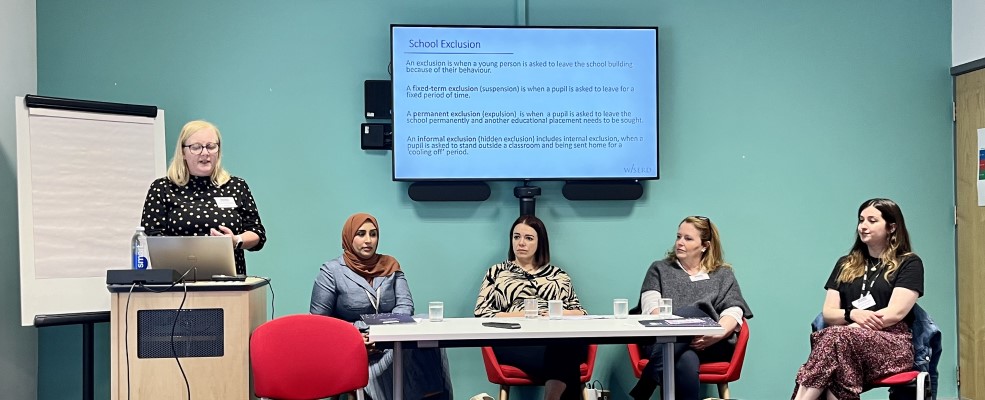At the recent WISERD Annual Conference, I gave a seminar with partners from civil society on school exclusion in Wales. The seminar explored the role of civil society in school exclusion and how families experience it. Below, I have included a summary of each presentation and a key takeaway for improving policy or practice.
Excluded Lives
Firstly, I shared some of the findings of the Excluded Lives project, which examined different types of informal and formal exclusion across the UK. I presented research on how parents of children with additional learning needs (ALN) had participated in the exclusion process.
The research findings showed that parents felt that if their children had received the appropriate support, the incidents that had led to their children being excluded from school might have been avoided.
Parents had found the school exclusion process stressful and procedural. Parents with advocates who supported them through the school exclusion process felt better equipped to deal with it and more aware of their rights.
Key takeaway: Advocacy emerged as important in supporting parents’ participation in the school exclusion process. The parents with access to advocacy services felt their advocates helped them bridge communication gaps and ensured their voices were heard and considered.
Parents Voices in Wales
Secondly, Ceri Reed from Parents Voices in Wales*, spoke about her work with neurodivergent families. Ceri began by explaining there is a lack of understanding about neurodivergence and its relationship to school exclusion.
Ceri explained that the term neurodiversity describes how no two brains are alike; it is a paradigm of human difference. When someone is neurodivergent, it doesn’t mean they have a deficit, but they will have a discrepancy between their strengths and challenges, creating a spiky profile.
Ceri had recently completed research with the families of neurodivergent children who had been excluded from school. Her findings showed that children were more likely to face repeated exclusions because of dysregulation and breakdowns in relationships with teachers and staff.
Her findings also revealed that the exclusions had negative impacts on families, including a loss of income and difficulties getting appropriate childcare for parents/carers who worked. Ceri explained that training all school staff is crucial to support neurodivergent children effectively.
Key takeaway: School staff need training on how to support neurodivergent children in school. This should include training on neurodiversity, trauma-informed approaches, and mental health awareness.
*Parents Voices in Wales is an all-Wales social enterprise that runs a parent and carer support group and campaigns for improved mental health and neurodiversity services by working collaboratively with all sectors in Wales.
Samaritans Cymru
Thirdly, Emma Gooding, from Samaritans Cymru, spoke about their work on school exclusion, explaining that they looked at it as a suicide prevention issue rather than an education one. She had held a roundtable with frontline service providers, police, council members, politicians, and individuals with lived experience. They examined the links between poverty, school exclusion, and suicide risk to identify actionable strategies to mitigate these issues.
One of the key insights from the discussion was the significant impact of school exclusion on children’s life chances. Exclusion from school is not just an educational issue; it is deeply intertwined with broader social inequalities and can have long-lasting effects on mental health and well-being.
Emma explained that discussions at the roundtable underscored the importance of a preventative approach to tackle the complex interplay between poverty, school exclusion, and suicide risk.
Emma stressed the importance of inclusive education environments, providing targeted support services, and addressing the broader social determinants of health to reduce suicide rates and improve the well-being of the most vulnerable citizens in Wales.
Key takeaway: School exclusion is an equality issue. A more inclusive education system and a preventative approach that tackles the interplay between inequality and school exclusion is needed.
Ethnic Minorities & Youth Support Team Wales (EYST)
Fourth, Jami Abramson and Amira Assami from the Ethnic Minorities & Youth Support Team Wales (EYST) spoke about the Right to Education project, which addresses the challenges faced by minority ethnic students in Wales. Jami explained that the evidence suggests that Black students and those from Gypsy, Roma, and Traveller communities are disproportionately excluded from school.
Jami explained that one of the project’s critical services is advocacy support for families dealing with school exclusions. Parents can feel disempowered and distrustful of the school system, especially if they have previously experienced discrimination. The project assists families in navigating the appeals process, preparing for meetings with school governors, and connecting them with legal support when necessary.
Amira spoke about some of the Right to Education project’s casework, which has involved issues related to racial bullying, unmet educational needs, and unfair disciplinary actions. Amira gave the example of supporting a 14-year-old student who was permanently excluded following a one-off incident despite showing remorse and apologising for his actions. Amira explained that he was a good student who had not been in trouble before this incident. Amira described how she had supported his family with the exclusion and the appeals process.
Key takeaway: Participating in the school exclusion process can be challenging, particularly for minority ethnic families who can feel disempowered by and distrustful of the education system. Specialist advocacy support can help parents navigate this process and uphold their children’s rights.
Reflections on the seminar
The seminar highlighted the need for a rights-based approach to school exclusion in Wales, emphasising the importance of advocacy, training school staff, and addressing broader social inequalities that contribute to school exclusion.
The seminar discussed how inclusive education can help tackle inequalities and prevent exclusions and the importance of advocacy to improve the experiences of families participating in the school exclusion process.
Jemma Bridgeman’s new, open access paper: ‘Parents’ perceptions of power in the school exclusion process examined through Arnstein’s ladder of participation‘ is now available.
Pictured above, left to right: Jemma Bridgeman, Amira Assami, Emma Gooding, Ceri Reed, Jami Abramson.

